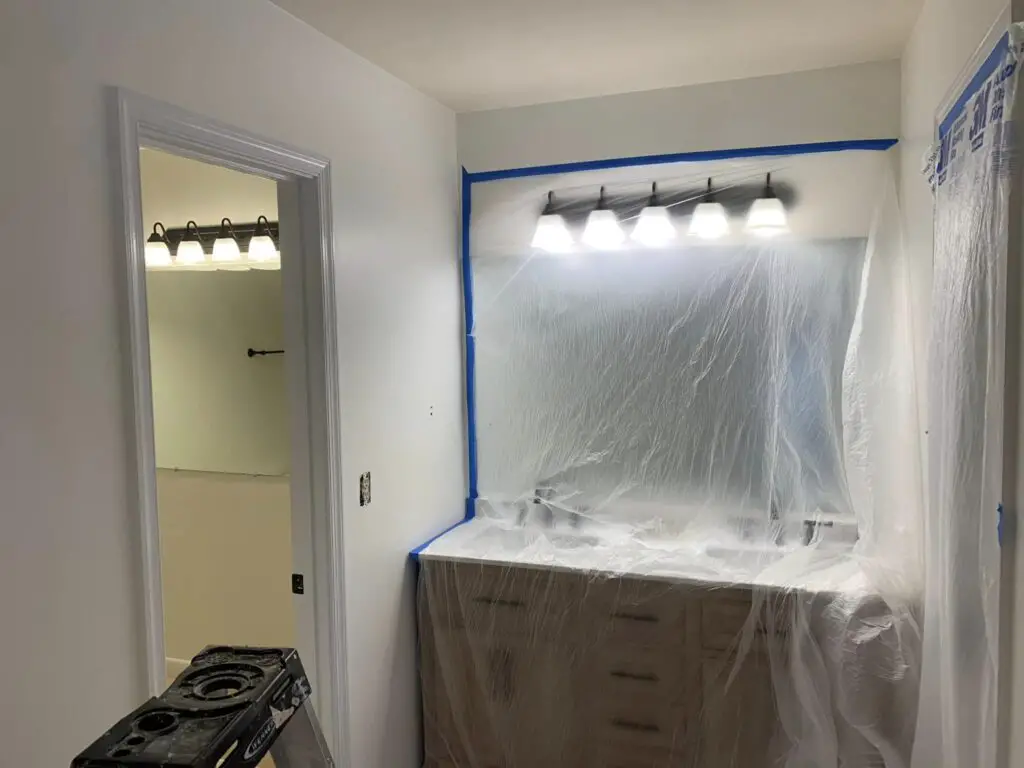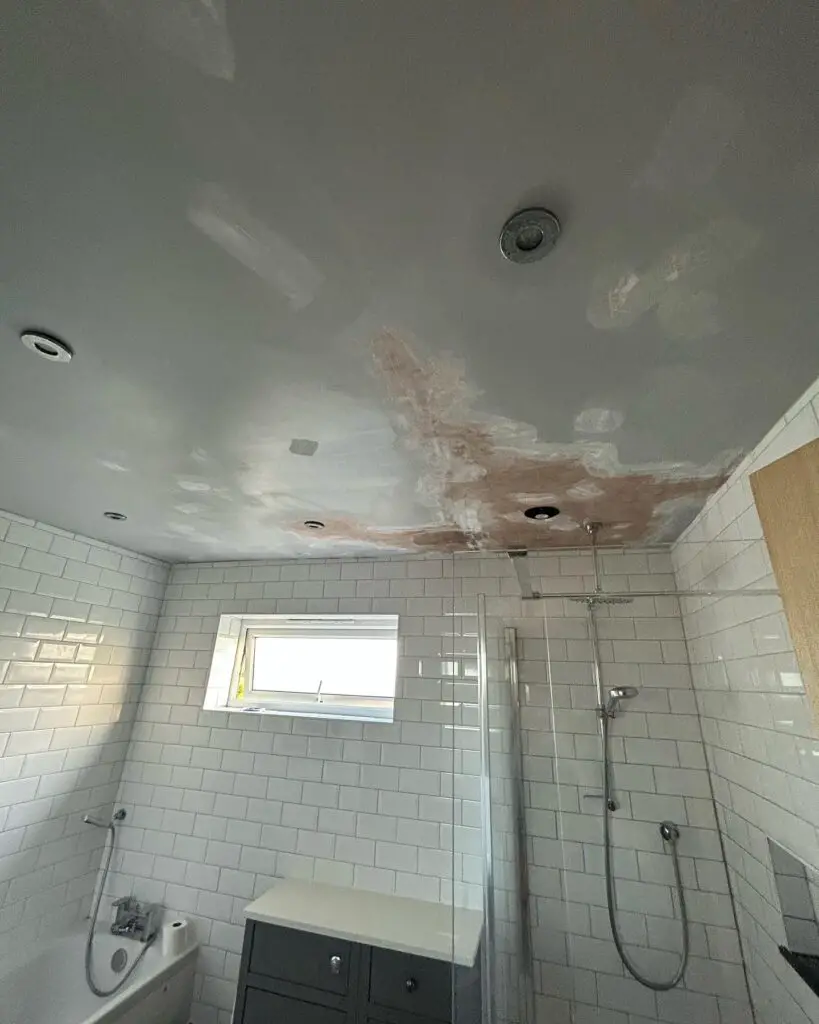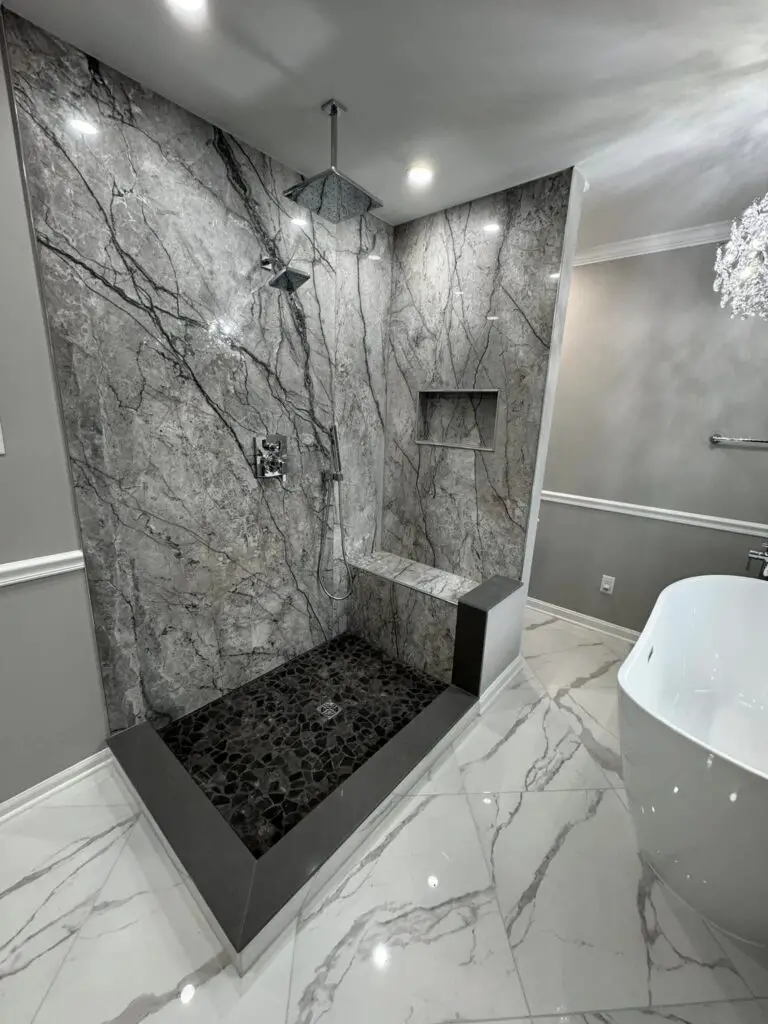Yes, you can shower in an unpainted bathroom if all the plumbing functionalities are working fine, the wall is made of concrete, and there is proper ventilation installed. But, if there is a second bathroom that you can use, I would suggest using that in the meantime.
A few years back, I was renovating the bathrooms, and proper ventilation wasn’t installed, and neither was the wall made of concrete. As a result, moisture has grown up and made a mess. Don’t make this mistake!
I will go through the reasons and situations related to this topic, so stay tuned!

Quick Jump
Reasons You Can and Can’t Shower Before Painting
Depending on the situation of the unpainted shower, sometimes you can shower in it, and sometimes, you can’t. Don’t worry! I will go through those reasons and situations briefly.
Here are the reasons why you can use the shower of an unpainted bathroom.
1. When the plumbing functionalities are working fine:
As long as the core shower components are correctly installed and connected to the working water supply and sewer lines, the shower can function fully for bathing purposes, even with unfinished walls.
That being said, if all the shower plumbing and fixtures operate as usual, regardless of whether the wall surfaces are being painted or not, you can shower in that situation.
2. If the shower wall is made of concrete:
You might already know that If the bathroom walls are bare concrete, this material can easily withstand direct water contact and humidity without a problem.
Besides, unlike drywall, concrete does not need any special sealant or paint coating to protect it from standard shower moisture. In my previous house, the shower wall was made of concrete, and I didn’t have to worry about moisture.
As you might know, the concrete itself is water-resistant and can handle being exposed to shower spray, condensation, and humidity without degrading or allowing moisture damage.
3. Proper ventilation is installed:
If you already have an exhaust fan in the bathroom, that would be very helpful. It will allow the surfaces to dry out and help keep moisture under control.
As a result, it will minimize excess condensation and humidity, which could cause mold, mildew, or other issues over time if left unchecked. The point is that proper ventilation is key for managing moisture on bare bathroom surfaces.
And reasons why you can’t use the shower of an unpainted bathroom:

1. There is a second bathroom to use:
I understand that it can be very inconvenient to use the shower during a bathroom renovation project before the space is finished. I have been there, and doing an entire bathroom remodel can take weeks or months.
I would suggest that even if everything is ok or functioning ok, it would be a good idea to use another bathroom.
2. If you don’t care about aesthetics:
Yes, priming or prepping walls for paint can come after you’ve used the shower for a while without issue. As a matter of fact, you may want fully prepared and painted walls eventually for aesthetics, and you don’t need to have pre-sealed or primed walls before enjoying the shower.
But bare drywall or concrete can handle showering for a reasonable time before needing paint prep and coatings.
Can You Shower In a Bathroom With Bare Drywall?
Yes, you can shower in a bathroom with bare drywall. As we already discussed, the primary reason is that the shower plumbing and fixtures can still function normally even if the walls are unfinished.
But as you might also know that, drywall is very prone to moisture damage when left unprotected over time. As a result, if the bare drywall has direct water contact or high humidity, it can cause many issues, such as bubbling or warping of the drywall surface, mold, mildew, or rot developing in and behind the drywall, joint tape adhesives breaking down more rapidly.
My suggestion is to properly prepare and seal drywall in moisture-prone areas with primers and bathroom-appropriate paints or sealants to prevent long-term damage or deterioration.
Otherwise, moisture permeating the drywall can eventually cause problems or require the drywall to be replaced much sooner, as you already might guess.
Other Potential Issues to Keep in Mind

As you already have a brief idea of what might or might not happen or issues that can arise, here are the common and potential issues to keep in mind if you want to shower in an unpainted bathroom altogether.
- The obvious issue is that excess moisture could promote mold/mildew growth on untreated drywall or surfaces over time.
- Not to mention, concrete, drywall, or other debris floating around is annoying and unhealthy to breathe in.
- Well, mineral deposits, soap scum, and other residues can stain unfinished walls and be trickier to remove later.
- Another thing to mention is that persistent moisture exposure can break down drywall joint tape adhesives over time, cracking seams.
Tips for Showering in an Unpainted Bathroom
Now, even if you have no other options or you need to shower in an unfinished or unpainted bathroom, here are some things you can do to minimize the damage. But, again, I must warn you that it is not advisable.
- I will also start with the most apparent tip again, which is to use a water spray with a high-quality vinyl or PE shower curtain.
- You must run the bathroom fan continuously, and the rule applies during and for at least fifteen minutes post-shower.
- You know what they say about showering in an unpainted bathroom: the cooler and quicker, the fewer moisture issues.
- Keep the bathroom door open after showering to promote cross-ventilation and let humidity dissipate quickly.
- You can also consider using a small dehumidifier or moisture absorber to help manage ambient humidity levels in the bathroom.
Wrap Up
I believe I delivered every piece of information I know about showering in an unpainted bathroom. You can or can’t, depending on a few situations or some factors to consider. The main issue is the moisture itself, and as long as you can deal with that, other things won’t bother you that much.
But you shouldn’t use it if there is any other option. I hope I cleared up your confusion. Have a great day!

Chino is an accomplished Founder and Home Improvement Contractor with a passion for transforming living spaces into beautiful, functional, and comfortable homes. With years of experience in the industry, he has established himself as a reputable expert in the field, earning the trust and admiration of numerous clients.
